Brief Encounter, 1946, directed by David Lean, written by David Lean, Noël Coward, Anthony Havelock-Allan, and Ronald Neame from the play Still Life, by Noël Coward.
Brief Encounter is the epitome of a genre that has completely vanished from cinema: the woman's picture.1 Jim Shepard memorably described this type of film as stories that:
...trundled through decades of forbearance: slow-moving, mile-long freight trains of self-denial. All those women gave up what they most wanted for somebody else's sake. Which meant that their movies centered on events that didn't happen: the singing career that wasn't begun, the wedding that didn't occur, the meeting in the park that never came off, the key phrase left unspoken. Which made for movies obsessed with the life not lived: a weird negative space of the never-was and the might-have-been.
Well, the one-two punch of capitalism and feminism seems to have pretty well put paid to self-denial as a filmic virtue. The demographic once courted by weepies now lines up to see chick-flicks, which offer a different kind of pleasure entirely: pure wish-fulfillment. Don't get me wrong, it's fantastic that we live in a culture where self-abnegation is no longer a universal female experience. But it's certainly stranded Brief Encounter. Shepard's essay dealt with the way Babette's Feast transcended the confines of the genre, but that's not how Lean's movie work: it's an exemplar of the form, not a film that challenges its boundaries. Appropriately enough, it opens with one of those mile-long freight trains of self-denial:
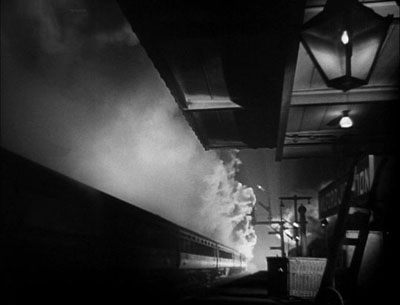
Okay, so it's a passenger train of self-denial, and it's moving at a good clip. But the main character's hopes and dreams might as well have been tied to the tracks for all the possibilities the film affords her. Lean cuts to a small refreshment room at the station, where the camera eventually settles on a couple quietly having tea:

That's Celia Johnson as Laura Jesson and Trevor Howard as Alec Harvey. Before we get to know much about them, they're joined at the table by Dolly, an older friend of Laura's who's talking as fast as the train that just passed. You can tell from Alec's expression how happy this makes them both:
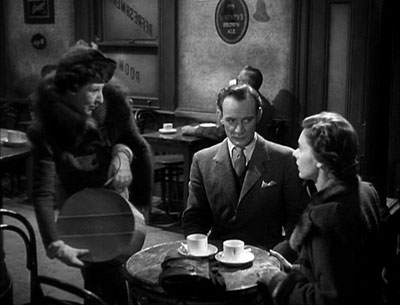
Dolly prattles on and Alec and Laura are relentlessly polite. Eventually, Alec has to leave to catch his train. Later, we learn that this is the last time the two will ever see each other: Alec is leaving for South Africa. And that's the film in a nutshell: Laura and Alec's chances at happiness are continually, ruthlessly crushed—if not by those around them, by their own senses of propriety.
The rest of the story is told in an extended flashback, as Laura thinks over her almost-affair. That's when the film becomes difficult to take seriously, not because its cultural values are so alien, but because it relies to an insane degree on endless voiceovers. You know the kind of voiceover Scorsese uses in Goodfellas, where the narrator's words are belied by what you're seeing onscreen? Or the kind you see in films noir like Out of the Past, where you forgive the clumsy exposition because the story's moving so quickly? Or even the kind you see in adaptations of novels, where the screenwriter wants to capture something of the author's voice and can't come up with a better way to do it? Yeah, that's not really what David Lean is up to here. Instead, Brief Encounter is filled with basically static shots of Celia Johnson:
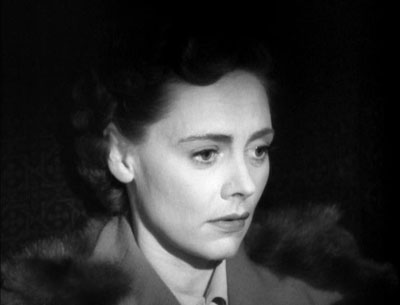
Over lines like this:
This can't last. This misery can't last. I must remember that and try to control myself. Nothing lasts, really—neither happiness nor despair. Not even life lasts very long. There'll come a time in the future when I shan't mind about this anymore, when I can look back and say quite peacefully and cheerfully how silly I was.
I did identify with Celia's character when she spoke those lines, but not for quite the reasons the filmmakers must have hoped. It's a shame about the voiceover, because when the film isn't relying on it, it's excellent. Lean captures the stifling, cramped quality of Laura's life brilliantly, and he doesn't need voiceover to do it. Take, for example, her husband Fred, played by Cyril Raymond as a well-meaning dolt who would never suspect his wife had any sort of inner life:
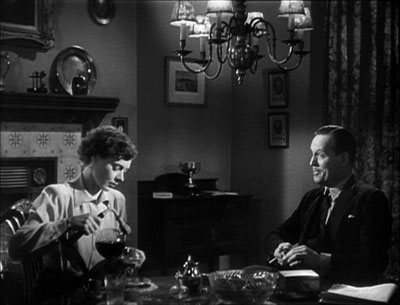
From what we see of Mr. and Mrs. Fred Jesson at home, his greatest passion is for crossword puzzles, not his wife. Here's the scene where she attempts to tell him she's met someone:
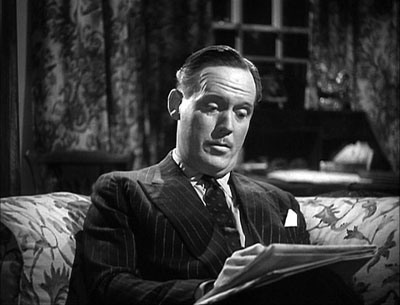
LAURA
I had lunch with a strange man
today, and he took me to the
movies.
FRED
Good for you!
LAURA
He's awfully nice, he's a doctor.
FRED
A noble profession.
LAURA
Oh, dear.
Beat.
FRED
It was Richard the Third who said
"My kingdom for a horse," wasn't
it?
LAURA
Yes, darling.
FRED
Well, I wish to goodness he hadn't,
'cause it spoils everything.
If he reminds you of Joylon Wagg, please be assured this is deliberate. Laura's life when she's not with Alec is so miserable that it lends credence to the one part of her voiceover that indisputably works: her reflexive hostility to everyone that surrounds her. This comes through in little moments like a scene where she's shopping at a pharmacy and briefly sees someone she knows socially.
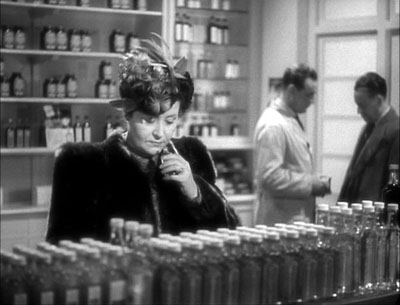
Here's the voiceover:
That awful Mrs. Leftwich was at the other end of the counter wearing one of the silliest hats I've ever seen. Fortunately, she didn't look up, so I got out without her buttonholing me.
The tragedy of Laura's life is that she never lets anyone know what she's thinking, and we get the impression that half of what clicks between her and Alec is that they're willing to tell each other when the stifling pressure of English good form gets to be too much. They first bond at a modest restaurant when they're confronted with possibly the worst cellist in the country:
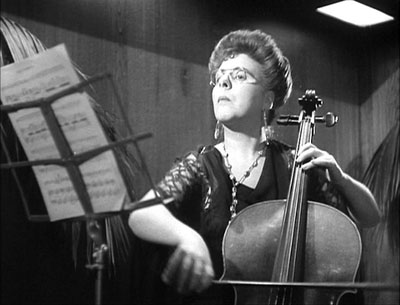
The single most attractive thing about Alec is that he's willing to respond in the only rational fashion:
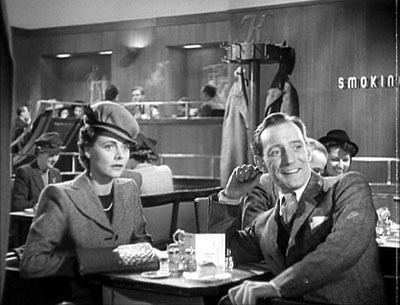
That afternoon, in one of the movie's best touches, the pair attend a movie and are greeted with a grim surprise at the Wurlitzer.
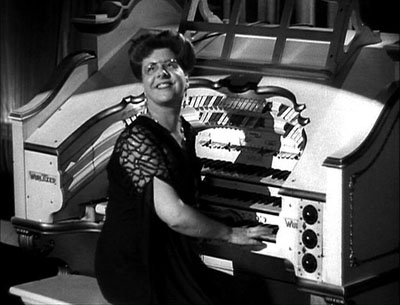
And that's all it takes. Alec doesn't really do much, except pay a small amount of attention to what Laura is saying, and react to the absurdity of English cordiality with a bit of humor. But someone as miserably lonely as Laura doesn't need much. In the end, however, he is as unable to make any definitive steps toward happiness as she is. And because of the film's flashback structure, we know all along where this is going: both of them are too unwilling to break decorum to even have a proper goodbye.
Watching today, it's impossible to fathom this kind of miserable self-control, and it makes some of their love scenes seem absurd. They're the first screen couple I would describe as "solemnly in love." Apparently, their reticence provoked jeers even at early test screenings, at least for working-class audiences (the middle class, on the other hand, loved the film). They don't even kiss until 45 minutes or so in—but it's worth noting that their brief moments of physicality are one of the things the movie gets right.
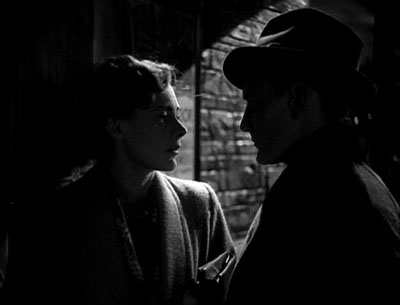
Robert Krasker, the DP, shoots them like it's a noir. They embrace beneath train platforms, with the rumble and squeal of an express roaring by above them. It's one of the best things in the movie, dark and furtive, and even—dare I say it?—sexy.
Well, I may say it, but neither Laura nor Alec would. And what one remembers most about Brief Encounter today is not the love story, such as it is, but the moments of supreme English social awkwardness that Lean captures.
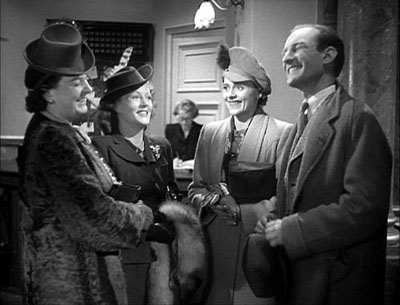
That's the two lovers caught at lunch by two bitchy friends of Laura's ("I do so envy you your champagne," one of them says). Alec has a counterpart scene of social humiliation when they are interrupted before finally consummating their relationship by the arrival of the friend Alec has borrowed an apartment from, the most sallowly unpleasant man in the world:
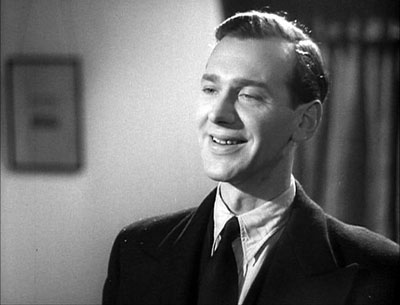
Neither Alec nor Laura can stand the social pressure: apparently, laughing at cellists is one thing, but doing anything to make yourself happy is quite another.
Brief Encounter is often called "the British Casablanca": a hyperbolic comparison, but a useful cultural barometer. It took the full terror of the Nazi war machine to stop Rick and Ilsa from choosing their hearts over their consciences. But in the British version of Casablanca, it took what, exactly? Fear of the disapproval of biddies in hotel restaurants? Laura's paralysis reaches apotheosis near the end of the film, when she realizes that Dolly has robbed her of any chance to say goodbye to Alec. This is her at her most desperate. The camera tracks in and tilts sickeningly (Carol Reed would be proud):
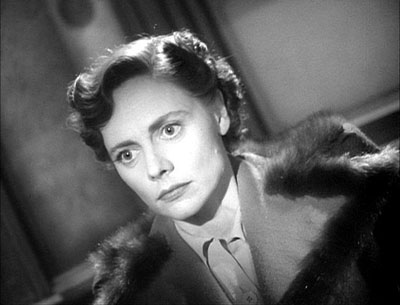
And at her moment of greatest despondence, Laura gets up from her table, runs to the tracks, and almost throws herself in front of a train. Just like she almost had an affair, almost consummated her relationship, almost left her husband. It's the film's best, sickest joke. Having failed to give her life any of the sweep of Anna Karenina, she is equally unable to recreate its finale. At least Anna got to fuck Vronsky.
Randoms:
- Trevor Howard also played Major Calloway in The Third Man. His performance here is so different that it took me half the film to recognize him.
- The original play took place entirely in the refreshment room where Alec and Laura meet. And apparently it did a great deal more with a subplot that's almost wholly superfluous here, a working-class romance between a conductor and a shopclerk that was contrasted against Laura and Alec's middle-class angst.
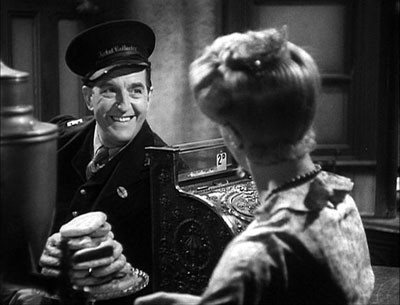
- Lean did the right thing by paring these two way back, but he might have done better by disposing of them entirely; they did nothing for me.
- Bruce Eder, who recorded the commentary track, hates the scene where Alec's friend interrupts the two of them at his apartment. He has a point: the rest of the film is scrupulously told from Laura's perspective, and she has no way of knowing what happened at that apartment after she left it. William Goldman eviscerated Saving Private Ryan on the same grounds (but with more cause: the whole movie is a flashback remembered by someone who wasn't there; at least Lean only has one scene with this flaw). But Billy Wilder apparently would disagree with Eder: he found Alec's friend so interesting that it gave him the idea for The Apartment.
- The sound mix is exceptionally sophistocated throughout, from the opening howl of a train whistle to the Rachmaninoff score.
- Laura's husband does get a moment of redemption at the very end of the film, and it's almost enough to make her sacrifice seem noble. Almost.
- There's a nice jab at the film industry buried in Brief Encounter. Alec and Laura see a trailer for a movie called Flames of Passion, which is the usual Hollywood bullshit: a woman tied to a burning stake, natives throwing spears, slightly unbelievable marketing slogans:
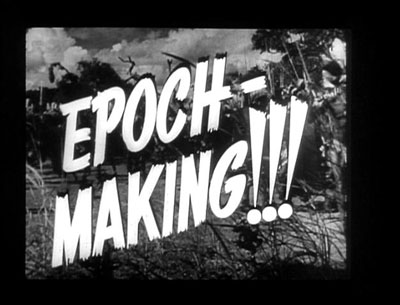
- But the best part of the joke comes when the actually go to see the film. Remember, the trailer looks like it could be for a low-rent version of King Kong. Check out the original source material:
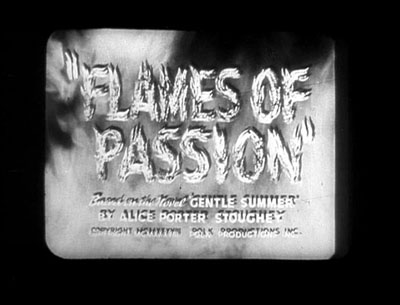
1Not counting semi-ironic revivals like Far From Heaven, one of Shepard's jumping-off points.


23 comments:
I am greatly enjoying your work here. I'm a person who reads so much and watches so much that endings rarely surprise me so it's a great pleasure to read someone who actually thinks about film rather then just reduces them down to nothing.
One thing I wanted to point out about this type of film is that it may not be culturally significant anymore because it's largely left the social expectation. We aren't a culture that sticks with anything that dosen't make us happy. I'm not sure we take the hard road. In fact most heroes in cinema male or female don't make sacrafices for the greater good. The revival of the western largely rewrites the idea that the hero must carry some great wieght of personal sacrafice, putting them in the role of ease as well. It would take way too much space to put examples and clear thesis here but this isn't just a problem with women's pictures, but with society as a whole.
The clearest example of this is our higher divorce rate. Of course it can be argued that having extra-marital release was always a class problem but I don't buy it. I think we've just changed to immediate fufillment and ditch those things that don't provide instant results. I guess I'm arguing like every conservative pundit. But there you are... I'd be interested in your thoughts.
Anonymous,
I'm glad you're enjoying the blog. I agree with you about the way changes in our culture have stranded this film's values. And like I said, comparing women's pictures to chick flicks makes it quite apparent how much things have changed. But Brief Encounter doesn't have much of an idea of the "greater good" -- what, exactly, are Alec and Laura sacrificing for? Laura's husband only has a brief scene at the end that suggests that he is anything but completely insensitive and oblivious, her children seem to be brats (one says something along the lines of, "Mummy, come upstairs at once, I want to talk to you"), and the society she's part of is portrayed as utterly corrupt and repulsive. Again, the comparison to Casablanca is instructive—that film does suggest (rather convincingly) that some things are worth more than personal happiness. Brief Encounter seems to take this as a given, but it doesn't make a very good case. If anything, it seems to be a pretty good argument for no-fault divorce: the alternative is unrelenting misery.
It's always been interesting to me that the abandonment of any sense of the greater good is continually lamented by conservative pundits, as you note. Because it seems to me that unfettered capitalism (especially in an enconomy driven by consumer spending) will inevitably skew a culture towards instant gratification. Like Willie Sutton says, that's where the money is. I'm not saying that's necessarily a bad thing (and it certainly seems preferable to the kind of self-immolation that appears to have been common when Brief Encounter was made). But there's a tension there that interests me. Why say you value one thing, then stack the deck against it?
To clarify, I'm not arguing that conservatives don't sincerely value choosing the good over the easy (as "why say you value..." may suggest), just that consumer economies inevitably move things towards choosing the easy over the good. Or to put it another way, how does one simultaneously support the abolition of no-fault divorce and the abolition of environmental regulations?
Wow, another review after only a week! Is this a harbinger of a quicker pace? :)
Kidding aside, count me as another who's greatly impressed with the writing here. You really should see if you can get these published in book form.
Brian,
Thank you! The problem with doing this as a book would be reproducing the images, but I thought I'd look into it when I had 100. And yes, I'm trying to pick up the pace a little; I'm watching And God Created Woman tonight.
Your comment on the current state of the chick flick as the new form of the weepie made me crack a smile. You quickly cite a quote (and open up a whole can o' worms) that boils the weepie down to stories of women in self-denial. I think it is workth mentioning the film (along with almost all films of its time) was written and directed by men. It makes sense that women's stories would have been told as stories of self-denial since there were scarcely any women in a position to write and direct their own stories back then. 1946 society was incapable of producing a significant film made by a female about a female. So really, the evolution of the weepie genre to what has come to be known as the chick flick genre mostly clocks the evolution of the male dominated film industry's narrow perspective of women and the types of stories of women that are allowed to be told. So males have come from viewing women as being in self-denial to wanting to fulfill their wishes. I see a positive shift here, however little or limiting.
A potential answer to the 'why are these British people acting this way?' question can be found in the character of Noel Coward - remember that he was gay, and that back in the 1940s the kinds of relationships a lot of homosexuals had would perhaps have been hidden and furtive, like Alec and Celia's.
Shawn,
Good point—the one real winner in the system of values that drives Brief Encounter is Fred. But also note that the reason men made these pictures (instead of, say, more monster movies) is because women went to them, in great numbers. It's not just a case of the male-dominated industry setting the terms for films; if women stopped going to chick flicks and started going to radical feminist films of self-discovery, that's what Hollywood would start making.
Jeff,
Good point -- something I was aware of and didn't occur to me the whole time I was writing. I'd say you can delete the "perhaps" in "would perhaps have been hidden and furtive" -- look what Great Britain did to Alan Turing in 1952—and he saved the country from the Nazis!
Matt,
You've mentioned before that clearing the pictures is the biggest obstacle to publishing. One entity that has (or could probably get) the rights to all of them is Criterion themselves. They might be willing to do a deal with you. Now that they've linked to your blog, it seems like you have an in. ;)
J.p.
J. P.,
I've been thinking about it. I need to clean up some of the earlier entries first.
Laura and Alec are firmly middle class, so they have everything to lose and nothing to gain by this affair. The rich - we Americans - can fuck around all we like, because the only real risk is a venereal disease. The poor - everyone else - can fuck around all they like because there is no social standing to lose and they'll have more kids to get them government funds and perhaps some help rebuilding the mud hut.
This is a firmly middle class story of its time. To rip this film for its innocence is just bad, and sad, reviewing.
Anonymous,
If you think I'm ripping the film for its innocence, you've misunderstood me. The only thing I "ripped" the film for were its voiceovers, which I still don't like. I do love your characterization of the poor: the romance between the conductor and shopclerk was certainly motivated by the desire for more kids, more government funds, and help rebuilding the mud hut.
You're right. The voice-over is relentless. I must have been nodding when I wrote that comment. And I do love this blog of yours, matthew, it is thorough, intelligent, and funnier than hell. In fact, I shall read more of it now...
Thanks!
Sean
"Genre that has completely vanished from cinema: the woman's picture."
Maybe I don't exactly understand the nature of this 'genre', but wouldn't Scorsese's "The Age of Innocence", or even "Brokeback Mountain" qualify?
Oh, yes, you're so insightful, what with your "fuck" and your "bullshit" and endless complaining about endless voiceovers.
But what can one expect from a representative of the American Weimar generation (and an Angelino, no less) when he writes "Watching today, it's impossible to fathom this kind of miserable self-control, and it makes some of their love scenes seem absurd." and believes it.
The only thing worthwhile in your analysis is the contrast between cultural necessity and individual desire, which is the inevitable tragedy of the human condition and always will be except, perhaps, in post-1960s, post-modern America where anything goes. No wonder you can use a word like "absurd" for this beautiful but doomed encounter between two lonely people.
Perhaps you could learn a few things about incorporating an overarching cultural and psychological perspective in your reviews from one written about John Huston's "The Man Who Would Be King" at Amazon.com. It's titled "The danger of losing one's head: a cultural and psychological perspective."
Robert,
I'm pleased to have lived up to your low expectations! Are you saying that in the struggle between cultural necessity and individual desire, you are always on the side of cultural necessity? What was so necessary about Alec and Laura's misery in Brief Encounter? Who benefited from it?
I just watched this film and I was eagerly searching the internet for some analysis as to the social context of this film, and I came across this old discussion. I think we can all project our values on this situation now, but what was the perspective of the day? The empathy with the woman reminds me of Chopin's Awakening, as well as the the inability for her to claim herself and her happiness being associated with her own death.
Actually, I find these themes still quite relevant. At least at the time, when women in our culture (and I say our, because this desperation still exists in plenty of cultures on the planet) had an extremely limited social position, I feel like these issues were given important notice. Whereas nowadays its too readily assumed that every woman is a liberated person, free from the unconscious expectation of the societal role she inhabits.
I also don't think the dichotomy of "hard" vs "good" is any more evolved than the standards of 1944, so to repeat those sentiments here is disturbing, but I suppose expected. The natural feelings that they need to live that are beyond pure lust or power or separation, but of themselves in sincerity, and yet are opposed to the boundaries of social norms are the issue. I like how that is dramatized by the couple finding sanctuary in nature, welcoming, holistic, generous nature. They can't stay away from society though, and so never truly cross over into themselves.
I find the substance of this film incredibly relevant actually. I hope everyone could enjoy the playing out of the different levels of human relationship, honesty, and dishonesty that occurs in society. Feelings deep and real in an unreal place. So who needs the unreal?
Matthew - got a whole shedload of self-righteous social conservatives here, don't you? I wonder if they'd feel the same way if, say, they were Alec, finding the weight of societal expectation against their own gratification?
Somehow, watching the last few elections here in the US, I Think Not.
PS: Don't expect you to post this b/c you're a movie review blog, not a political one. Just wanted you to read it - and to say, I agree w/you on this movie selling the Forties women who went to see it a bill of patriarchal goods. Also, the voice-overs are so ripe, they belong on a SCTV parody of BRIEF ENCOUNTER....
Mike Nichols and Elaine May do a great parody of this movie on their CD, "Improvisations to Music." It's brilliant and incredibly funny.
Fran M. & Timothy Liebe,
Timothy, you're right that this film is ripe for parody, and judging from Fran's post, you weren't the only person to think so. I love Nichols/May & will seek out their version; thanks for bringing it to my attention!
Thanks, Fran and Matthew! :) I'll have to look for IMPROVISATIONS TO MUSIC now, clearly....
One minor point I wanted to make to
Shawn McGuire's comment - there were women writers and directors in Golden Age Hollywood like Frances Marion, Anita Loos, Salka Viertel, and Dorothy Arzner. While in the minority as compared to their male counterparts, they did exist - and much of their work as at least as soupy as this is. I suspect they too were burdened by societal expectations, and limited in how far they could push the envelope.
While I agree with your premise that our culture has significantly changed since 1946, I do not believe that it has changed so much that it has “stranded this film’s values.” Nor do I think that what you call “self-abnegation” is an exclusively female experience. Even in this film, told from a woman’s perspective, Alec also denies himself.
You further suppose that Alec and Laura’s lives are at best unfulfilling before their paths cross and likely to be miserable afterward. I see no evidence of this. We know little of Alec’s home life, but we never hear him disparage his wife. Laura’s son makes a bratty comment, but there is nothing to suggest that Laura doesn’t love her son and daughter. Even bratty children have devoted parents. Laura’s husband, from what I can see, is often at home with the children when Laura is not. He’s communicative: he and Laura have a fair exchange regarding their son’s future. He is aware that his wife is troubled. He is, in fact, quite solicitous. The only reason he works on the crossword is because Laura tells him to stop fussing about what is bothering her and get on with it. The flashback even begins with Laura thinking that she wishes she could tell her husband all about the affair, that he is the only person in the world “with enough wisdom and gentleness to understand.” She ends the film in his arms.
Far from being merely tolerable, Alec and Laura both appear to lead reasonably contented lives. The difficulty in deciding whether or not to pursue their affair is that their home lives are not miserable. Laura’s choice is not between the love of a lifetime and a lifetime of self-abnegation. It is a choice between the known and the unknown, stability and risk, comfort and adventure.
The film is beautiful and still relevant. Richard Dyer in his analysis of Brief Encounter writes that “A nation’s characteristic culture may on inspection usually be a narrow and class-specific one, but it is nonetheless what passes for the national culture.” I wonder if the reductive description of our culture as one of instant gratification is an example of this. In my experience there are plenty of people in the 21st century making daily decisions that put others first, decisions based not on self-interest but upon their affection for and loyalty to others. Who benefits from Alec’s and Laura’s sacrifice? Their families. This doesn’t make them martyrs. It makes them adults.
Plenty of people conform. We usually consider these people dull, so we don’t write about them or make movies about them. Brief Encounter explores the story of two people who make the decision to conform. This film tells us these decisions come with a cost. It does not tell us that these decisions are devoid of reward.
Post a Comment